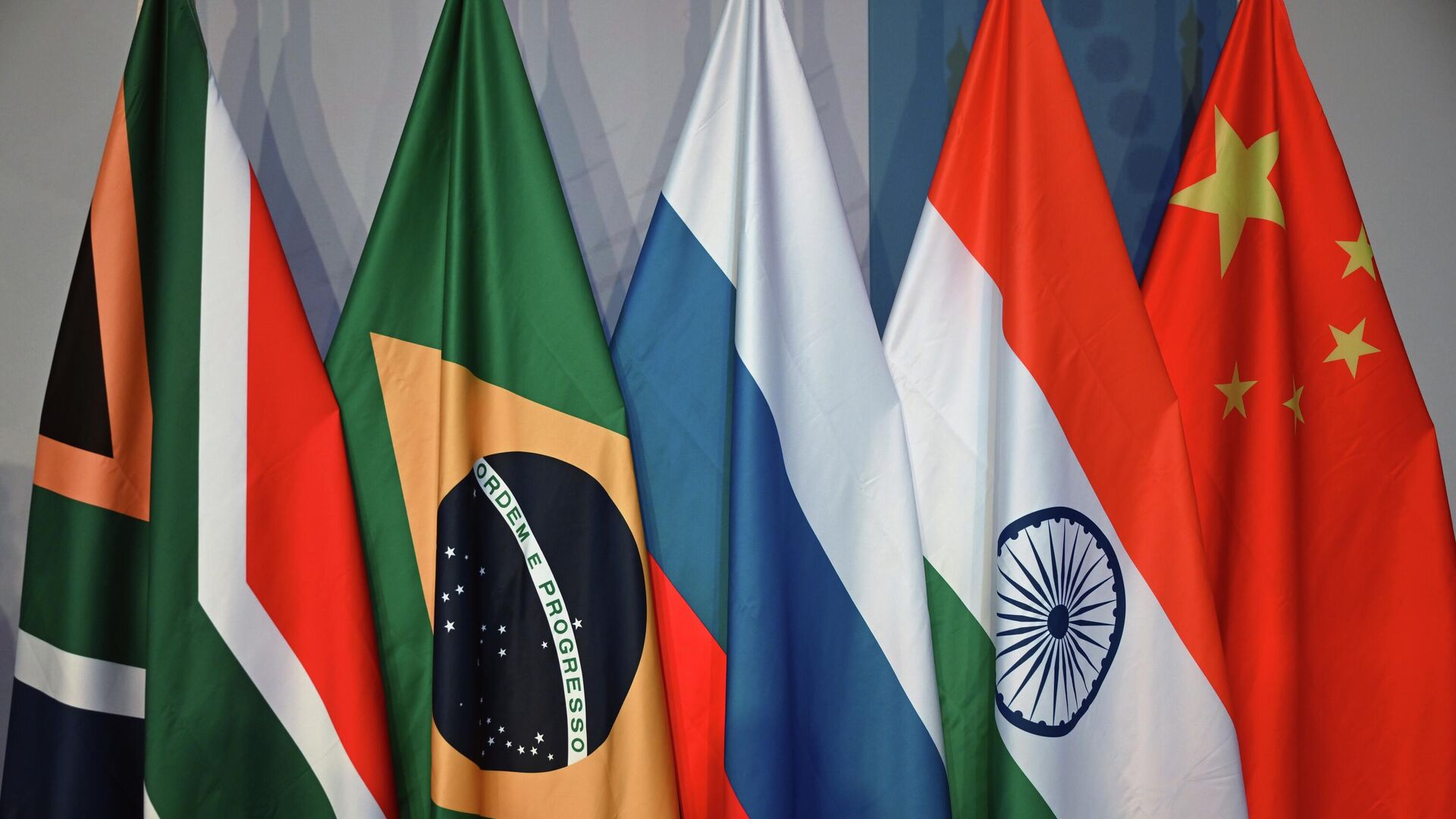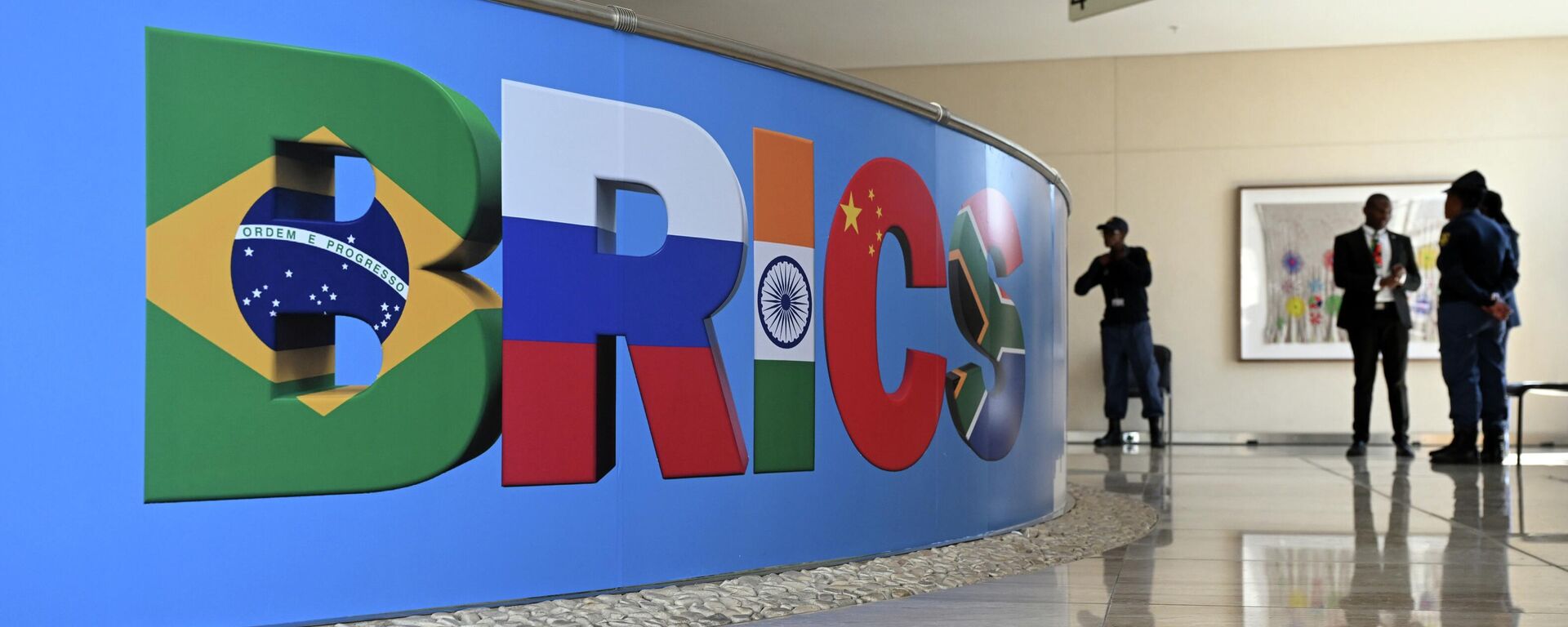Russia to Bring New Life & 'Ambitious' Agenda to BRICS During Its Chairship: Expert
18:09 02.10.2023 (Updated: 18:10 02.10.2023)

© Sputnik . Grigory Sysoev
/ Subscribe
According to Russian President Vladimir Putin, the BRICS group is not a military alliance, but a platform for developing positions based on sovereignty and respect for each other. Such an approach to cooperation has attracted many countries of the developing world willing to enhance relations with the association.
As Russia assumes BRICS chairship in 2024, the year that marks the expansion of the group to 11 members, the country will breathe "new life" into the economic bloc with its "ambitious" agenda on key issues of cooperation, including security and economy, said Philani Mthembu, Executive Director at the Institute for Global Dialogue, South Africa, in an interview with Sputnik Africa.
"I think it's going to be quite ambitious, and it [Russia] obviously sees BRICS as being very important to its own foreign policy and its strategic interests. So I think it's going to present a very ambitious agenda when it comes to peace and security[...]," he said, adding: "Russia will come with a very ambitious presidency that injects new life into the grouping."
According to the expert, BRICS proved to be an important platform for "consensus building among key issues in international relations." Recalling the words of the Russian leader about the non-military nature of the group, he noted that the BRICS countries are among the world's main advocates for peace and stability. They are calling for de-escalation of any tensions on the international arena and for global cooperation for the sake of the people's well-being and the world's development, he elaborated.
"The BRICS countries remain one of those voices for peace, for development, for cooperation, because they also understand that greater stability, greater development, greater cooperation is in their national interest, it's in the interest of the development of their respective regions, but it's also in the broader interest of humanity," he stated.
The expert spoke to Sputnik Africa on the sidelines of the the 20th annual meeting of the Valdai Discussion Club, which kicked off today in the Russian city of Sochi.
Mthembu went on to say that the BRICS member states are dedicating resources to global development efforts, reforming and changing "the landscape of development finance."
Politicians from the Global South have repeatedly criticized the international lenders, the International Monetary Fund and the World Bank, for their rules on lending and debt servicing for developing countries. According to the expert, the way that these institutions "calculate risk in the Global South is completely wrong and very exploitative," while requiring nations to pay exorbitant interest rates.
In this regard, he noted, the New Development Bank and the BRICS group could play their role in altering the current situation by actively advocating for these changes and promoting the interests of the developing world.
"That's a major challenge for many developing countries. They are paying very high interest rates," the director of the independent think tank said, adding: "BRICS countries need to continue to advocate for changes in the Bretton Woods institutions so that they change their lending practices and that their lending practices become more in favor of the development priorities of the Global South."
The analyst also underlined the need to "put more mechanisms in place" so that the Global South can continue its development path without relying on financial support from international lenders. He explained that many countries have been subjected to unilateral sanctions, and against this backdrop, the BRICS group needs to "make sure that the rest of the international community" doesn't support these measures.
Therefore, it's necessary to create alternative mechanisms in terms of economic cooperation, he said, stressing that sanctions "harm the international development aspirations of many countries in the Global South," including those that are not directly subjected to sanctions.
'Historical Mandate' to Shape New World Order
Mthembu pointed out that although BRICS primarily operates as an economic bloc, aiming to establish "a new economic order" and enhance worldwide economic collaboration, it also plays a role in global political shifts, facilitating the creation of a new world order.
"I think that is part of its historical mandate [...]. As you advance reforms economically, it also leads to positive political changes. So the BRICS have to be at the center of advancing for a new international order," he explained.
In this context, the expert recalled the recent expansion of the group, highlighting the significance of this development to Africa in particular. Two African countries, namely Ethiopia and Egypt, will join the association on January 1, 2024.
According to the analyst, the membership of these countries in BRICS will contribute to the overall development of the continent and help Africa to make its voice heard. It also gives the region an opportunity to participate in the global processes initiated by the association of the world's leading emerging economies.
"Now you've got a key country like Ethiopia, huge population, fast economic growth, a lot of infrastructure projects being undertaken. Egypt on the other side [...] is playing a very key role in bridging Africa and the Middle East. So the addition of Egypt and Ethiopia, alongside South Africa, strengthens Africa's voice within the process," he said.
The BRICS bloc, which comprises Brazil, Russia, India, China and South Africa, recently opened its doors to six new members, including Argentina, the United Arab Emirates, Saudi Arabia, Iran, Ethiopia and Egypt.


